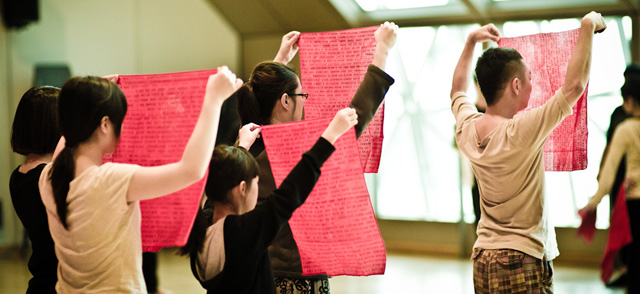
Conflicts and Consensus
“Wouldn't it be nice if we all felt for and
understood one another?”
(Bus Stop, Gao Xingjian)
Written by Cheow Boon Seng
During Singapore’s early days of nation-building, the issues of “race” and “religion” were considered sensitive topics that could easily blow up with a spark. And because we learnt a grave lesson on the consequences that resulted when these issues were mismanaged, we advocated “consensus, not conflict” as our shared values in nation-building — few words with profound significance — avoiding conflicts by resolving any disparities through consensus, while stressing on the importance of compromise and national unity.
A few years back, in the power-struggle incident that happened in AWARE, the rage and aggression displayed by the women caught most people off-guard, and drew both praises and criticisms. I felt those “extreme” reactions were but a conscious tactical strategy. After all, since it was a fight that was almost equivalent to a “political election”, how else should contestants behave? While the conflicts seem to have been resolved now, there does not seem to be any consensus: there were “parents” who petitioned for AWARE to discontinue their sexual education classes in schools, to which MOE responded by making great changes to the curriculum; a certain member of the parliament criticised the women for being uncivilised and accused “The Straits Times” of being biased, and “The Straits Times” retorted by way of a written response; people wrote in to the press, arguing about the relationship between religions and politics; NMP Siew Kum Hong was under constant scrutiny by the public, and now we can only address him as Mister Siew… The exchange of blows only proved that the conflicts were swept under the carpet, much less allowing any room for consensus.
The influx of foreigners will also be an ever-present concern. The recent MTR conflict in Hong Kong led its people to hit the streets singing an “anti-locust” song, in a demonstration to chase the Mainland “locusts” out of Hong Kong. In Mainland China, the more affluent Shanghai and Shen Zhen citizens discriminate against foreign workers; Australians discriminate Asian migrants; in Europe, there was the Oslo massacre that was racially motivated against the Muslims. While globalisation has brought about the greatest migration in human history, it has also been proven that conflicts and disparities between locals and foreigners are deeply embedded in history, regardless of culture. Singapore’s low fertility rate challenges the nation’s manpower resource, and the nation’s stance to welcome and attract foreign talents is an imperative political decision. The conflict that we face is not an exception, and will not be easier to manage just because the majority of our population is Chinese.
The rational idea of “consensus, not conflict” may have worked in the past, probably because the platforms for the expression of views were limited to traditional media, and the censorship system also helped in creating a pacifistic guise over any discussion of conflicts. However, with increasing platforms for free speech such as the Internet, we can only expect to see more surfacing of conflicts.
Similarly in politics, there used to be very few MPs from the opposition parties, and decision-making was almost single-handedly done by the ruling party, with very weak opposing voices. With the reform in the current system, and as we welcome a new outlook in our political scene, debates and conflicts are bound to increase in days to come.
In short, there will only be more and more conflicts, and fewer consensuses. There will be a lot of undercurrents beneath the surface of society, waiting for the day to arise.
In fact, the disparity in ideologies and opinions is inevitable in any society. I carry no value judgment in the word “conflict”. Taking the AWARE incident as an example, I would rather believe that both parties harboured good intentions. However, because both parties believed and insisted on their values as the truth, conflicts were inevitable. Since both parties had different guiding principles that were difficult to compromise, consensus is of course out of the question.
For many years, we’ve upheld the value of “consensus, not conflict”. Our citizens are also used to the mitigating ways of handling disagreements, even looking to our government to mediate conflicts. However, we have now come to a new phase in history, where the people hold higher demands towards freedom and openness, and the government cannot and should not be expected to be the only source of answer to any problem. In the AWARE incident, the government chose to distant its involvement. In the more recent cases such as the closure of the Tanjong Pagar railway tracks and the road-planning development through Bukit Brown, the government also chose to approach these cases with careful distance, and also restituted certain power and roles to the citizens, striving to solve problems through the community. Such “doings” and “non-doings” fully illustrate that political leaders are aware of the demands of the people.
As we make room for conflicts to brew and expand, we are actually testing the maturity of our people. As conflicts emerge, especially when sensitive issues such as religions and race are implicated, I am concerned whether our people are mentally ready to face these challenges in a rational and positive light. When more and more conflicts arise in more aggressive ways, what we need is the maturity to acknowledge and accept the presence of differences, and not the outright rejection of any conflict, because the mere search for consensus, or even the luxury of resolving contradictions, is no longer as easy as how it used to be in the past.
Photography by: Pantheon

|
The writer is a young local playwright and a teacher. |
Win a pair of tickets to Bus Stop!
Have you ever been to a performance where your otherwise perfect experience was disrupted due to poor theatre etiquette from another audience member? Share with us your most unforgettable encounter as a victim of such disturbances!
- All entries should reach us by 9 March 2012.
- In case of dispute regarding contest
winner and prize, the decision of
Drama Box shall be final.

